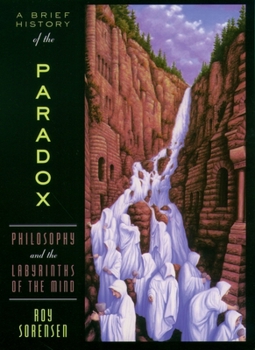A Brief History of the Paradox: Philosophy and the Labyrinths of the Mind
Select Format
Select Condition 
Book Overview
Can God create a stone too heavy for him to lift? Can time have a beginning? Which came first, the chicken or the egg? Riddles, paradoxes, conundrums--for millennia the human mind has found such knotty logical problems both perplexing and irresistible.
Now Roy Sorensen offers the first narrative history of paradoxes, a fascinating and eye-opening account that extends from the ancient Greeks, through the Middle Ages, the Enlightenment, and into...
Format:Paperback
Language:English
ISBN:0195179862
ISBN13:9780195179866
Release Date:January 2005
Publisher:Oxford University Press
Length:416 Pages
Weight:0.85 lbs.
Dimensions:1.1" x 5.0" x 7.0"
Customer Reviews
2 ratings
Vast perplexities
Published by Thriftbooks.com User , 17 years ago
Generally speaking, there is no charm in certainty. Riddles amuse because they take some dull, every day word and, by shrouding it in mystery, transform it into a stimulating challenge. Paradoxes do something similar: they defy our notion of logic and show us conundrums where we only had rock-solid truths. A paradox enriches our reality by undermining it. Roy Sorensen, Professor of Philosophy at Dartmouth, has written a dazzling book that traces the evolution of some of this conundrums throughout (western) history. As the topic itself, this book can be frustrating at times, but it always remains strangely compelling. Starting with the Presocratics and ending with W.V. Quine, the chapters are ordered chronologically and they tend to focus on a specific author, a paradox he may have discovered or worked on, and several possible solutions to it by an array of philosophers from different ages and schools of thought. The historical context provided usually takes a life of its own, though, and Sorensen is likely to spend more time gossiping about, say, Aristotle possibly being a Macedonian spy or Kant's ailing mental faculties than delving into the paradox at hand. Since the book is mainly aimed at armchair philosophers, I suppose some academicians may only see lack of depth in Sorensen's jovial writing style. And, to be honest, he does sometimes seem to be overly interested in retelling memorable anecdotes and witticisms rather than in meticulously analyzing arguments and pinpointing logical fallacies. But I do not think this makes his work any less worthwhile. He is not trying to be the Copleston of paradox, a go-to historian. Sorensen is just offering his readers a delightful look on a few great men, a few great questions. As himself admits in his preface: "I am interested in the developmental and antiquarian aspects of paradoxes. Consequently, my approach is more leisurely. Although I have my own theory of paradoxes, my general intent is to have paradoxes enter at their own initiative (...) The deepest paradoxes are extroverts, naturally good at introducing themselves." However, I will not deny that the pace gets too "leisurely" at times. Mischievously dragging the Lewinski scandal into Parmenides' Theory of the One and Bette Middler into Pascal's vacuum experiments may be fun for a while, but when one thinks about the number of things Sorensen left out, one starts wondering if he could have used his space more wisely. For example, Eastern philosophy - so rich in riddles and devilish contradictions - has been almost completely neglected; and so has Quantum mechanics, with the million bewildering and hotly controversial paradoxes it has lead to. It should also be noted that while Sorensen dedicates whole pages to talk about the already well-known lives of Socrates and Hume, for example, he rushes the explanation of certain paradoxes and solutions (e.g. Carter's Doomsday argument and Cantor's answer to Zeno) that should be explained in more det
More than just paradoxes
Published by Thriftbooks.com User , 18 years ago
As the title states, this is a HISTORY of paradoxes. The focus is on the development of thinking about these problems from ancient Greek times to the present. But to a great extent Sorensen's book is also a history of philosophy (which shows just how important paradoxes have been in philosophy). The topics covered include such things as the nature of God and of time, fatalism, Hume's skepticism, and many other things. Sorensen makes it all relatively easy to follow and includes many interesting asides (e.g., when Pascal tried to convince Descartes that vacuums exist, Descartes quipped that Pascal had too much vacuum in his head). There are other books out there that concentrate more on the resolutions, or attempted resolutions, to paradoxes. But what this book offers is just as valuable.






